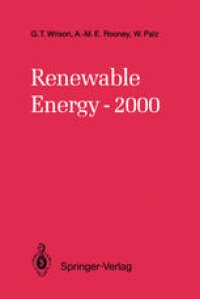
Ebook: Renewable Energy-2000
- Tags: Renewable and Green Energy
- Year: 1993
- Publisher: Springer-Verlag Berlin Heidelberg
- Edition: 1
- Language: English
- pdf
The limited available of fossil energy carriers and the environmental impacts of energy consumtion demand mid-and long-term strategies both for the rational use of energy and for increased renewable energy utilization. Concepts of renewable energy conversion have been proposed and implemented during recent decades allover the world and their remarkable potential has been demonstrated. However, large scale implementation in the context of the requirements above has not yet taken place. The EUREC (European Renewable Energy Centres) Agency - an association of 25 European research centres from 11 EC countries, provides a framework of leading experts in the field of renewable energies, focusing on assessment studies, joint projects in research and development and on proposing future strategies in a European context. Under the leadership of Professor Wrixon, with the assistance and contributions of experts from the EUREC Agency, the document 'Renewable Energy - 2000' has been elaborated. This document critically evaluates the potential of renewable energies, focusing on the most relevant sources and methodologies, namely: wind energy, solar heating, cooling and daylighting, photovoltaics and biomass. It also proposes strategies for implementing components and systems to achieve economic operation in different regions of the European Community. It thereby makes use of the expert knowledge and experience concentrated in EUREC Agency member institutions.
The limited availability of fossil energy carriers and the environmental impacts of energy consumption demand mid- and long-term strategies both for the rational use of energy and for increased regenerative energy utilization. Concepts of regenerative energy conversion have been proposed and implemented during recent decades all over the world and their remarkable potential has been demonstrated. However, large scale implementation in the context of the requirements mentioned above has not yet taken place. The EUREC (European Renewable Energy Centres) Agency - an association of 25 European research centres from 11 EC countries, provides a framework of leading experts in the field of regenerative energies, focusing on assessment studies, joint projects in research and development and on proposing future strategies in a European context. Under the leadership of Professor Wrixon, with the assistance and contributions of experts from the EUREC Agency, the document Renewable Energies - 2000 has been elaborated. This document critically evaluates the potential of regenerative energies, focusing on the most relevant sources and methodologies, namely: wind energy, solar heating, cooling and daylighting, photovoltaics and biomass. It also proposes strategies for implementing components and systems to achieve economic operation in different regions of the European Community.
The limited availability of fossil energy carriers and the environmental impacts of energy consumption demand mid- and long-term strategies both for the rational use of energy and for increased regenerative energy utilization. Concepts of regenerative energy conversion have been proposed and implemented during recent decades all over the world and their remarkable potential has been demonstrated. However, large scale implementation in the context of the requirements mentioned above has not yet taken place. The EUREC (European Renewable Energy Centres) Agency - an association of 25 European research centres from 11 EC countries, provides a framework of leading experts in the field of regenerative energies, focusing on assessment studies, joint projects in research and development and on proposing future strategies in a European context. Under the leadership of Professor Wrixon, with the assistance and contributions of experts from the EUREC Agency, the document Renewable Energies - 2000 has been elaborated. This document critically evaluates the potential of regenerative energies, focusing on the most relevant sources and methodologies, namely: wind energy, solar heating, cooling and daylighting, photovoltaics and biomass. It also proposes strategies for implementing components and systems to achieve economic operation in different regions of the European Community.
Content:
Front Matter....Pages I-1
Executive Summary The Study....Pages 2-12
Introduction....Pages 13-18
Wind Energy....Pages 19-35
Solar Heating & Cooling and Daylighting....Pages 36-51
Photovoltaics....Pages 52-68
Biomass....Pages 69-92
Conclusions: Prospects for the Development of Renewable Energy in Europe to the year 2000....Pages 93-111
Back Matter....Pages 112-126
The limited availability of fossil energy carriers and the environmental impacts of energy consumption demand mid- and long-term strategies both for the rational use of energy and for increased regenerative energy utilization. Concepts of regenerative energy conversion have been proposed and implemented during recent decades all over the world and their remarkable potential has been demonstrated. However, large scale implementation in the context of the requirements mentioned above has not yet taken place. The EUREC (European Renewable Energy Centres) Agency - an association of 25 European research centres from 11 EC countries, provides a framework of leading experts in the field of regenerative energies, focusing on assessment studies, joint projects in research and development and on proposing future strategies in a European context. Under the leadership of Professor Wrixon, with the assistance and contributions of experts from the EUREC Agency, the document Renewable Energies - 2000 has been elaborated. This document critically evaluates the potential of regenerative energies, focusing on the most relevant sources and methodologies, namely: wind energy, solar heating, cooling and daylighting, photovoltaics and biomass. It also proposes strategies for implementing components and systems to achieve economic operation in different regions of the European Community.
Content:
Front Matter....Pages I-1
Executive Summary The Study....Pages 2-12
Introduction....Pages 13-18
Wind Energy....Pages 19-35
Solar Heating & Cooling and Daylighting....Pages 36-51
Photovoltaics....Pages 52-68
Biomass....Pages 69-92
Conclusions: Prospects for the Development of Renewable Energy in Europe to the year 2000....Pages 93-111
Back Matter....Pages 112-126
....